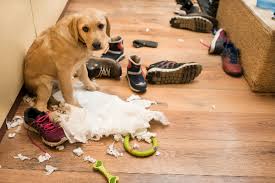As we know separation anxiety (S.A for short) is a stress related condition affecting our dogs. How can we help them with this condition, first let’s begin by understanding the mechanics of S.A. Why do our dogs suffer with this affliction? As most people are aware the dog is a pack animal, and they are usually at their happiest when the pack/family are together as one. The root cause of S.A is when our dogs have been pre-conditioned to co-exist with their fellow packmates from an early age when pups are born they enter the Postnatal stage this is 2 – 6 weeks old when the new puppies begin to move around, gain the sense of sight and hearing and begin developing the bond with their siblings. The whole litter will make that bond, and safety and companionship will be evident. The puppies then enter the socialization period at 6 to 8 weeks and start to build confidence and recognise sounds in the area of the den, for example washing machine, tv, vacuum cleaner sound of the carer preparing food. The puppy is now classically conditioned to recognise all the sounds and associate and pair the sounds with actual occurrences, e.g feed time and life seems great. Then one day along comes the perspective owner and chooses their new puppy and its off to the new home, new people, new sounds and separated from the litter mates. This is the first taste of separation for the puppy, and it takes them a while to learn the new routines and build the all important bond with the new packmates. After a few days the puppy settles in and begins to trust the new pack and life becomes happy again, the puppy spends a lot of time together with the new family, then suddenly everybody vanishes and the puppy is alone, he becomes very frightened and lonely and craves the company of the pack, he does not understand the human world, and has no idea what work and school is. The puppy becomes very distressed and the natural action for any dog is to bark and howl to reform the pack, when this does not work he becomes more stressed because he does not understand why he has been isolated/abandoned by the pack, this often brings the dog to destructive chewing. Our dogs chew to relieve stress, as the action of chewing reduces anxiety by signalling the brain to release natural endorphins. So how can we help
as soon as we bring home the new puppy will first need to settle in, then we need to introduce mini separations, by making the puppy safe in his surroundings with plenty of chew toys and licking toys, we begin giving the puppy alone time. Starting small with 1 minute and building by 1 minute a day until we can achieve up to an hour, try not to return to puppy if he is barking or howling, wait for a quiet moment to return and reward. If we can achieve this early on then we can build confidence and condition the puppy to be happy alone. Try to stop the puppy following you around the house, use the doors or stairgate to create mini separations. Desensitise the doors by practising door is a bore exercise, walk to the door look at it and return to your seat. by now the puppy should be learning that its no drama when you leave the room and relax becoming happy to be alone.
if you would like to learn more on this subject the visit http//pawsativechoices.com


